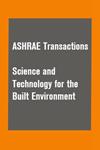基于强化学习的无模型多输入多输出控制
IF 1.7
4区 工程技术
Q3 CONSTRUCTION & BUILDING TECHNOLOGY
Science and Technology for the Built Environment
Pub Date : 2023-08-30
DOI:10.1080/23744731.2023.2247938
引用次数: 0
摘要
本文章由计算机程序翻译,如有差异,请以英文原文为准。
Model-Free MIMO Control Tuning of a Chiller Process Using Reinforcement Learning
The performance of HVAC equipment, including chillers, is continuing to be pushed to theoretical limits, which impacts the necessity for advanced control logic to operate them efficiently and robustly. At the same time, their architectures are becoming more complex; many systems have multiple compressors, expansion devices, evaporators, circuits, or other elements that challenge control design and resulting performance. In order to maintain respectful controlled speed of response, stability, and robustness, controllers are becoming more complex, including the move from thermostatic control, to proportional integrator (PI), and to multiple-input multiple-output (MIMO) controllers. Model-based control design works well for their synthesis, while having accurate models for numerous product variants is unrealistic, often leading to very conservative designs. To address this, we propose and demonstrate a learning-based control tuner that supports the design of MIMO decoupling PI controllers using online information to adapt controller coefficients from an initial guess during commissioning or operation. The approach is tested on a physics-based model of a water-cooled screw chiller. The method is able to find a controller that performs better than a nominal controller (two single PI controllers) in terms of decreasing deviations from the operating point during disturbances while still following reference changes.
求助全文
通过发布文献求助,成功后即可免费获取论文全文。
去求助
来源期刊

Science and Technology for the Built Environment
THERMODYNAMICSCONSTRUCTION & BUILDING TECH-CONSTRUCTION & BUILDING TECHNOLOGY
CiteScore
4.30
自引率
5.30%
发文量
78
期刊介绍:
Science and Technology for the Built Environment (formerly HVAC&R Research) is ASHRAE’s archival research publication, offering comprehensive reporting of original research in science and technology related to the stationary and mobile built environment, including indoor environmental quality, thermodynamic and energy system dynamics, materials properties, refrigerants, renewable and traditional energy systems and related processes and concepts, integrated built environmental system design approaches and tools, simulation approaches and algorithms, building enclosure assemblies, and systems for minimizing and regulating space heating and cooling modes. The journal features review articles that critically assess existing literature and point out future research directions.
 求助内容:
求助内容: 应助结果提醒方式:
应助结果提醒方式:


